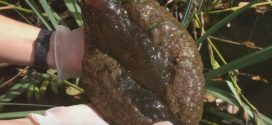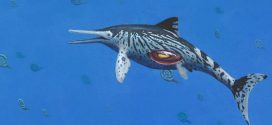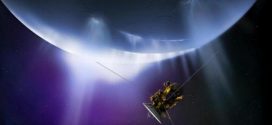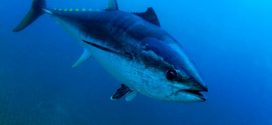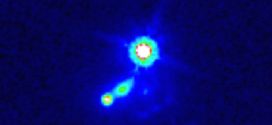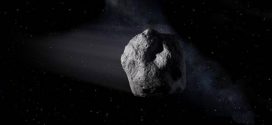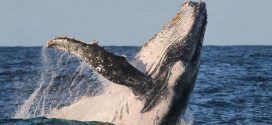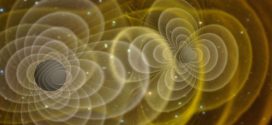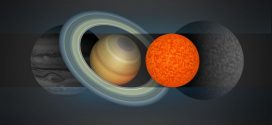Th species found in Stanley Park, known as a magnificent bryozoan or Pectinatella magnifica, normally only dwells east of the Mississippi river. Researchers claim that warming global temperatures may have forced the bizarre organisms north of their normal habitat – but they can’t be sure. Kathleen Stormont, from the Stanley Park Ecology Society, told the Vancouver Courier: “They’re a colony …
Read More »Science
Largest Ichthyosaurus was pregnant at time of death, says new research
The biggest fossil ever found of a dinosaur-era marine reptile called the Ichthyosaurus was pregnant when it died. Scientists say they found an embryo inside the skeleton that includes pieces of vertebrae, ribs, a forefin and a shoulder blade, according to a study in the journal Acta Palaeontologica Polonica. Although pieces have been added to the fossil to reconstruct the …
Read More »Nasa’s Cassini set for fiery plunge into Saturn
Launched 20 years ago, NASA’s Cassini spacecraft now has less than 20 days for its mission-ending dive into the atmosphere of Saturn. On September 15, after a distant flyby of Titan, Saturn’s largest moon, Cassini will descend into the planet itself, burning up while transmitting atmospheric data back to Earth. It will enhance our understanding of the Saturn system until …
Read More »Carbon nanotubes desalinate water, says new study
Scientists are using carbon nanotubes as a filter to desalinate water, a technique which could prove easier, faster and cheaper than other desalination processes. With the increasing demand for fresh drinking water as populations rise the search to produce sustainable methods to cope have never been greater. Researchers at the Lawrence Livermore National Laboratory in collaboration with Northeastern University in …
Read More »Climate Change Could Cause Fish to Shrink in Size, Study
In the coming decades, warming ocean temperatures could stunt the growth of fish by as much as 30 percent, according to a new research in the journal Global Change Biology. The main driver behind this decline in size is that warmer water contains less oxygen. As Nexus Media explains, fish are cold-blooded animals and therefore cannot regulate their own body …
Read More »A Galaxy Five Billion Light-Years Away Shows We Live In A Magnetic Universe
Researchers has observed the magnetic field of a galaxy five billion light-years from Earth. The galaxy is the most distant in which a coherent magnetic field has been observed and provides important insight into how magnetism in the Universe formed and evolved. The observation shows a magnetic field of a similar strength and configuration to that seen in our own …
Read More »Huge Asteroid to Safely Pass Earth on Sept. 1
Asteroid Florence, a large near-Earth asteroid, will pass safely by Earth on Sept. 1, 2017, at a distance of about 4.4 million miles, (7.0 million kilometers, or about 18 Earth-Moon distances). Florence is among the largest near-Earth asteroids that are several miles in size; measurements from NASA’s Spitzer Space Telescope and NEOWISE mission indicate it’s about 2.7 miles (4.4 kilometers) …
Read More »Researchers claim whales were once top tier predators
Millions of years ago, whales looked very different from the gentle giants we know today. They were comparatively small (about three to five meters long, or 10-16 feet) and had a battery of formidable teeth. The international study, headed up by researchers from Monash University in Australia’s Victoria, was the first to find that ancient whales possessed teeth that were …
Read More »Researchers may have detected a new ‘kind of gravitational wave’
Black holes outside our galaxy may be fundamentally different from those found in the Milky Way, scientists have found. In our galaxy, scientists have been able to detect black holes from their electromagnetic emissions. Outside our galaxy, gravitational waves carry information about black holes that can tell us about their nature and origins. The paper, published in Nature, is based …
Read More »“Albertavenator curriei” New species of bird-like dinosaur discovered
Researchers from the Royal Ontario Museum (ROM) and the Philip J Currie Dinosaur Museum have discovered a new species of 71 million-year-old bird-like dinosaur in Canada that is roughly the size of a human. The find recognizes Currie for his decades of work on predatory dinosaurs of Alberta. Research on the new species is published July 17 in the Canadian …
Read More »Scientists discover the smallest star in the universe
A team of astronomers led by the University of Cambridge have discovered the smallest star yet. EBLM J0555-57Ab is located about six hundred light years away and is a sliver larger than that of Saturn, with a gravitational pull at its stellar surface about 300 times stronger than what humans feel on Earth. The news bodes well for the detection …
Read More » Canada Journal – News of the World Articles and videos to bring you the biggest Canadian news stories from across the country every day
Canada Journal – News of the World Articles and videos to bring you the biggest Canadian news stories from across the country every day
